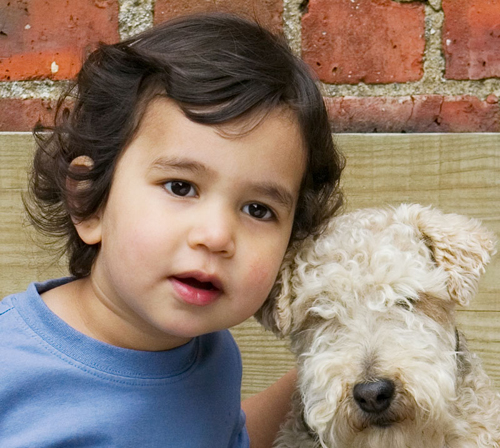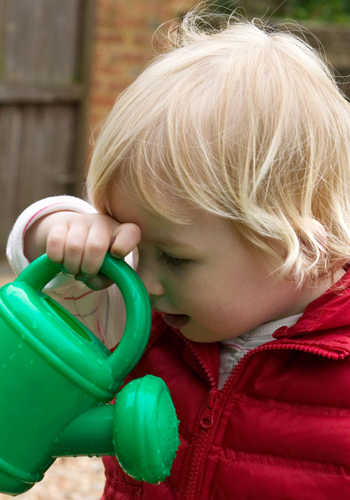Dear Tanya
| Q: |
I feel guilty because I get so bored with playing games with my
two-year-old daughter for longer than 10 minutes at a time.
| | A: |
You are by no means alone in your feelings. Many parents find it
extremely hard to remain consciously engaged as their son or daughter
insists on playing something “Again!” The reality is that 10 minutes at a
time is probably all your toddler can deal with, too. The rest of the
time she is just enjoying your company.
This phase of
development will pass all too quickly, so it may help to remind yourself
that within six months she will be much more comfortable playing with
other children and will not need to rely on you quite as much.
Use your time with her
to encourage her to practice sharing and taking turns, so the adjustment
to cooperative play with other toddlers will come more easily. Focusing
on her, rather than the game, will stimulate your interest. Watch how
she is looking, listening, and learning with every activity she takes
part in—and congratulate yourself for your active part in bringing up
your happy and healthy little girl. Although child-led play is the ideal
scenario, if you are getting impatient, why not involve her in
something you would rather be doing—in a playful way?
|
| Q: |
I want to stop breast-feeding my two-year-old daughter, but I’m worried she will become distressed by this.
| | A: |
The question of breast-feeding is a highly personal one. The
reality is that by the age of 24-36 months your toddler no longer needs
your breast milk for nutritional reasons. She has the ability to
self-feed now, and the quality of your breast milk will no longer be as
nutrient-rich as it was when she was a baby.
Therefore, the
main reason for continuing to breast-feed at this age is for comfort,
both yours and hers. It may be hard for both of you to adjust initially
because your daughter associates breast-feeding with being loved and
nurtured. But there are other ways to show her affection and if you want
to stop breast-feeding now she will adjust quite quickly if you begin
to offer other options, such as a cup of milk while she snuggles close
to you. This replaces one association of comfort (your breast) with
another (the cup). In fact, she may “let go” more easily than you.
It may be easier to
stop breast-feeding when you are away from home in a different
environment. By the time you return home, breast-feeding will likely be a
distant memory for your daughter.
|
| Q: |
Our three-year-old son will smile at, and hug, almost everyone
he meets. How can I keep him safe from strangers, while not scaring him?
| | A: |
News stories may make us fearful that every child is in constant
danger from strangers, but the statistical reality is that children are
more at risk from traffic accidents than abduction. If they are harmed,
it is more likely to be by someone they know than a stranger. However,
it is important to teach your child who it is okay to hug and speak to,
and to tell him not to accept gifts from strangers. There is no need for
a detailed explanation. Just praise his appropriate behavior and say,
“No” to inappropriate behavior.
|
5 points to remember
Life skills
A well-trained and tolerant family pet can make the perfect
playmate and companion for a young child, as well as helping him learn
how to be gentle and care for others.

Let her help
Include her in activities, such as gardening. It is a great way
to give her your attention but still get on with your own tasks, and she
will be learning the whole time.

You
are your toddler’s anchor and his safe haven. He needs you to help him
manage, understand, and direct his feelings in a way that makes him feel
comfortable and that he is in control. Pushing
your child too fast will not lead to faster development; conversely, it
may cause anxiety and lead him to give up because he cannot achieve the
necessary results. During
difficult times you may question your parenting ability and wonder
whether you are doing something wrong. When this happens try to see the
situation in context. Remind yourself that it is normal for all toddlers
to misbehave sometimes. Help
your child rehearse a cooperative style of play, in the safety of his
relationship with you, where he can avoid the power struggles that will
inevitably happen with his playmates. Many
parents believe that their toddler is being willfully naughty or is
scheming. In fact, at this age they do not have the moral reasoning
skills to do either.
A word about anger
Children are often
the barometers that indicate what is really going on in a household.
They are intuitive and will have learned to read you in subtle ways.
When adults are distressed or in conflict, children can take it
personally. If you are upset, they are upset—and the chances are that
they will assume it is their fault on some level (and sometimes it may
be). Unable to separate your emotions from their own experience, a
toddler who witnesses his parents arguing may feel fearful and be
overwhelmed. He won’t be able to take in or process anything else
because he feels unsafe. In extreme situations, where conflict is
ongoing, he may regress to an earlier stage of development. However,
arguing is normal and you can’t protect your child from life’s
unpleasantness entirely, nor would that be healthy. It is how you manage
the conflict that will have the greater long-term impact. Your toddler
needs to know that he can trust you to keep him safe, and help him
manage his feelings by comforting him. This way he discovers that even
though upsets happen, he is still loved and secure.
Managing adult disagreements
Parents are human, too.
Just as you are trying to help your child to manage his frustrations, so
too you may need to consciously learn how to control your own.
Agree to a cooling-off period before you discuss the cause of your anger. Be honest with one another about how the other person’s action makes you feel. Comment
on the action, but avoid criticizing the person. Adults, like children,
need to know it is their behavior you are rejecting rather than them as
a person. If
your child overhears your argument and is upset, explain that “Mommy
was upset with Daddy [or whoever is appropriate], but we’re not upset or
angry with you.” Offer your toddler reassuring hugs, but don’t explain the details. A child doesn’t need to be burdened with adult issues. Never be tempted to encourage a child to take sides, or to act as a go-between in some way. If you find you are constantly arguing, consider seeking help from a couples counsellor.
|